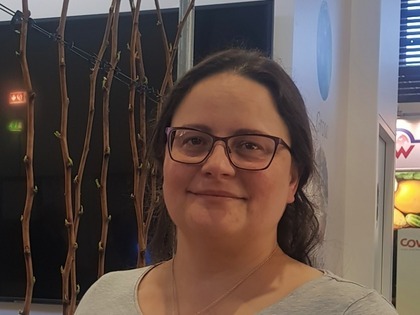
For International Day of Women and Girls in Science we’re introducing you to several female scientists from across the NIAB group. Read their blog posts or watch their videos. In this post, we hear from Felicidad Fernandez, a fruit breeder in the genomics, genetics and breeding department at NIAB EMR, based at East Malling in Kent:
What does your job involve?
Day to day, I manage two of NIAB EMR’s commercially-funded fruit breeding programmes; one for raspberries and blackberries and the other for rootstocks for apples and pears. I also get involved with research and PhD projects that are relevant to these crops.
Recently I’ve started developing a blueberry breeding programme. I’m trying to identify commercial partners and get funding for various aspects of the programme – there is a lot of interest in the crop but it takes a lot of time to get done!
How did you get involved in science?
It’s fair to say I didn’t have a clear plan! I come from a mining area in Spain where most families used agriculture as a second source of income. I enjoyed growing food so I did a degree in agronomy, but at university I got excited by genetics and breeding. The idea of creating new varieties was very exciting and the research around genetics really intrigued me. At that point, I realised I needed some additional skills. So, as part of my studies, I spent a year at University of Bologna (Italy) where I volunteered with a molecular genetics team working on maize. In 2001, I came to the UK and worked as an intern at Rothamsted Research for a short while to get more lab experience and later the same year I moved to what is now NIAB EMR – the name has changed three times, but I’ve worked in same building for 19 years!
Initially, I worked with the apple breeder, before moving into raspberry breeding. Here I worked part time with Vicky Knight, the lead raspberry breeder, learning the ropes before inheriting her breeding programme in 2008. Vicky had taken over from Dr Elisabeth Keep in the early 1980’s, so I’m proud to say I’m the 3rd generation of women raspberry breeders on the site! Other breeding programmes have become my responsibility over time due to staffing changes in the company or new areas of expansion.
So while some people have well planned out careers, I was in the right place at right time with the right skills and interests; there is a lot to be said for serendipity!
Proudest achievement for NIAB?
The release of the raspberry variety Malling™ Bella. I’ve been working on its development since 2009 and I was over the moon when we finally released it in 2017. It’s early days still, but so far it looks very promising. It is performing well for UK and Spanish growers and orders for 2020 are over 1.2M plants. I was so excited when I saw it in my local supermarket this summer! My daughter was with me and thought I was the uncoolest mother on the planet – but I was thrilled to see something I started working on a decade ago in my local shop!
Although it’s a proud achievement for me, developing a new variety is very much a team effort and I am lucky to work with a great one made up of a few permanent staff and many interns or visiting workers. Mentoring and supervising those ‘passing-by’ colleagues has always been one of the most rewarding parts of my job. We’ve had over 40 interns in the last 15 years and many of them stay in the horticulture some even in plant breeding!
Biggest challenge and how did you overcome it?
I did go through a period of depression a couple of years ago triggered by a combination of stress at work and family issues. The upside from this difficult periods is that I’ve learnt to balance my work and home life much better. I think it’s a common problem for many scientists and one that we don’t talk about enough. Having a job you love is supposed to make up for being very busy but without the right home/work balance it can be very stressful and lead to ‘burn out’. I try to use my own experience to be a better manager than I was.
Any tips for aspiring scientists?
Obviously the first step is to choose the field of interest and take some form of formal training – that helps you get there. But, if you want to stay for the long run, even more important is to get some practical experience. Especially before committing to a PhD, take some time to get some research experience. Go and work in a lab and see what people actually do with most of their time;find out what the day-to-day practicalities are like.
A lot of research involves repetition and time-consuming data gathering; this is not for everyone. I have known people with a generic interest in science or not quite knowing what was next for them starting a PhD straight from their degrees only to find out that they do not enjoy the nitty-gritty of the project they chose to work on.
If you manage to find some joy on the less exciting tasks and can keep your eye in the bigger picture of why you are doing what you are doing, there are some really exciting opportunities in plant sciences. I for one cannot recommend fruit breeding enough as a career!
